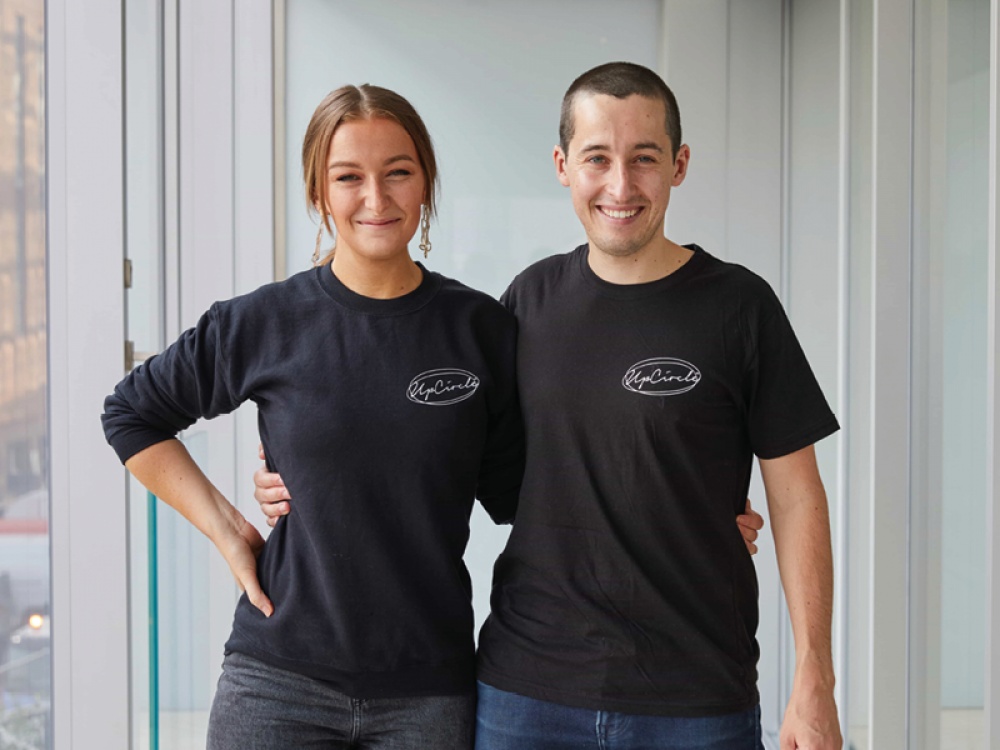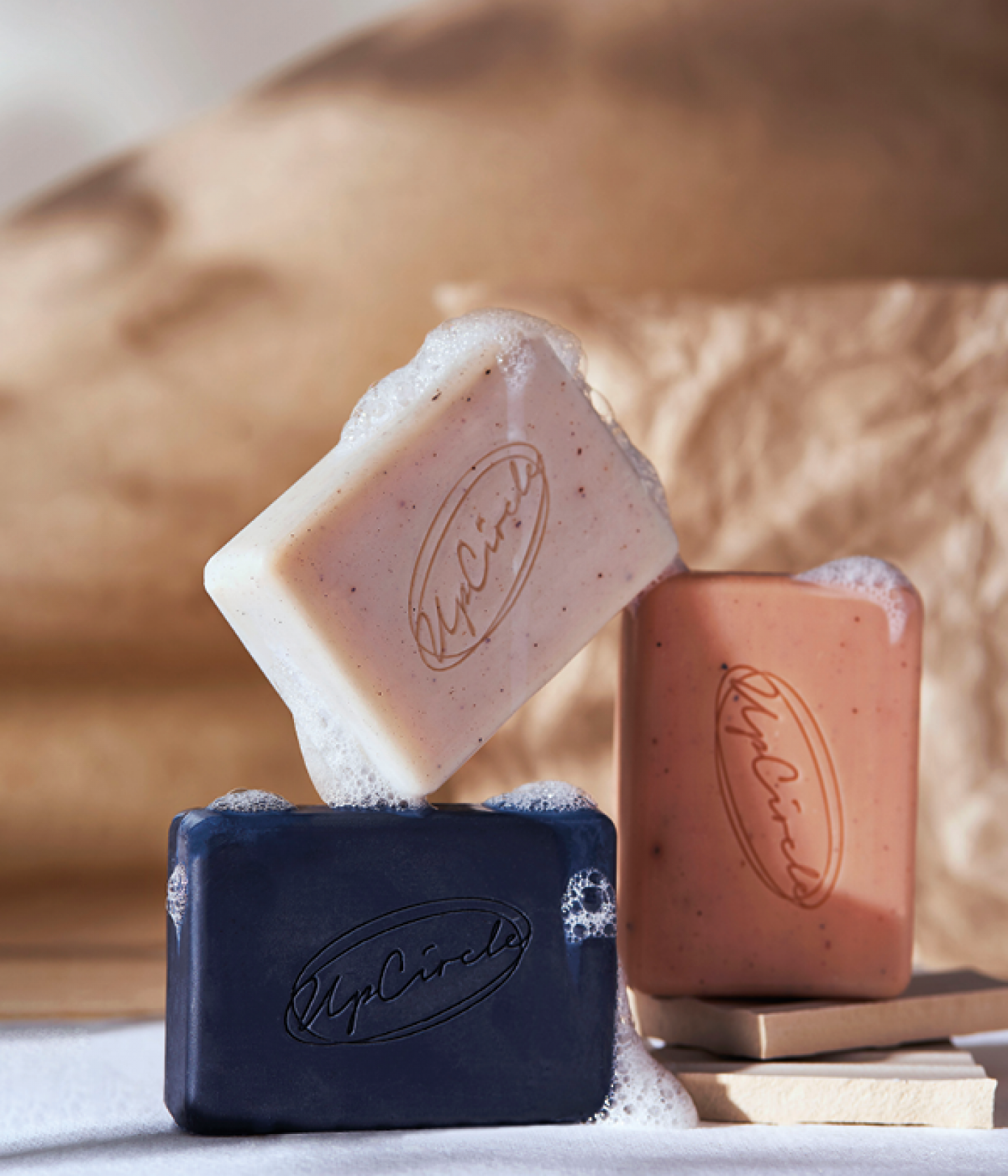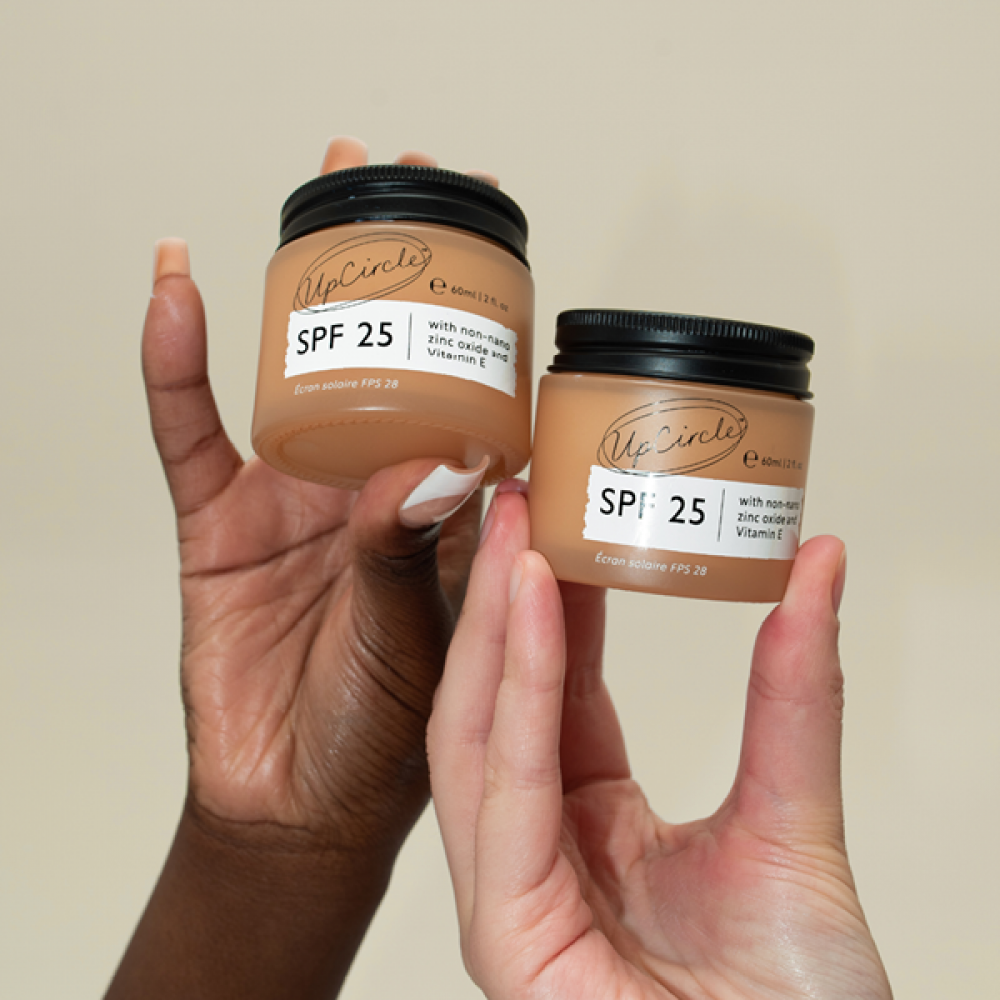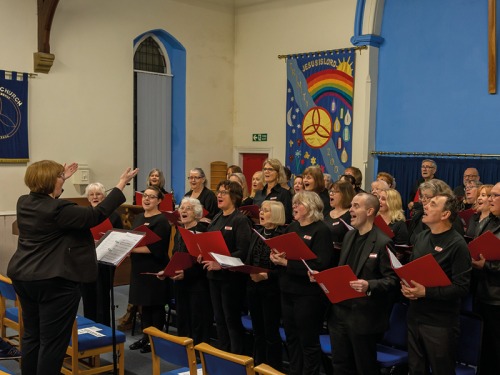Meet the Owners of the Organic Beauty Brand Using By-Product Ingredients

University of York alumni Anna Brightman, and her brother William, launched UpCircle with the aim of turning ingredients that would otherwise be discarded into a natural, organic beauty range
While we’d probably all like to, not everyone comes up with a million-pound business idea over their morning cup of coffee. However William Brightman did just that in 2016, going on to co-found global beauty brand UpCircle with his sister Anna.
‘So it was actually my brother’s idea, annoyingly!’ explains Anna. ‘He would go to the same coffee shop in Canary Wharf every morning on his way to work and one day he asked the barista behind the bar what happens to the coffee that they tap out of those little metal pucks with each cup of coffee that they make. He was really shocked when the guy basically said that they produce so much each day that they have to pay the local council to have it disposed of.
‘Because coffee is a natural organic ingredient you don’t really imagine that it’s got this huge negative environmental impact, but unfortunately when it’s disposed of on an industrial scale it goes into black bin bags and those bin bags go to landfill where the coffee grounds rot to produce methane, which is a greenhouse gas. That’s a real problem, and the more research we did into this the more it seemed like a no-brainer to start trying to minimise it.’
Read More: Meet the Founder of The Dip and Dales Co. Who Create Quirky Swimming Costumes from Recycled Bottles


Despite having studied History of Art at the University of York, as a teenager Anna wanted to be a makeup artist and always had a keen interest in skincare. It was this background knowledge that helped the siblings find a solution to the problem. ‘Both my brother and I were keen to form our own business which had a positive environmental impact, and I knew that caffeinated products, particularly eye creams or serums, are some of the most widely searched for terms,’ says Anna. ‘No one on the market was making products from upcycled ingredients at this point seven years ago, so we quit our jobs and started UpCircle based on the idea of salvaging coffee grounds from cafés and restaurants and turning them into natural exfoliators, which were our first products. That’s where it all started.’
Read More: Meet Durham's Sustainable Fashion Brand NOVO
At that point Anna and William decided that their USP would be to use upcycled ingredients in every skincare product they made. The pair have come a long way since then, now offering a full range of skincare, bodycare and haircare, as well as plastic-free accessories that complement the skincare range such as a reusable safety razor, bamboo ear buds, and reusable makeup pads. But what hasn’t changed is their commitment to upcycling. They currently use more than 20 different by-product ingredients in their range, from a variety of different sources.
‘The ingredients that we work with come in many different forms,’ explains Anna. ‘We’ve things like upcycled blueberry and raspberry extracts, maple bark and date seed extracts, and they’re all in an oil consistency. Then we’ve got powders such as argan shell powder or olive stone powder which are by-products of making oil, and oat powder which is from the husks of oats. We’ve also got a whole series of waters. It seems a bit bizarre but you can upcycle water from the juicing industry using the water that’s evaporated off the fruit juice which is then sold as concentrate, so we use upcycled kiwi fruit water, bergamot water, and mandarin fruit water as well. I think over the last seven years we’ve really shown the possibilities that are out there if you are imaginative enough, and willing to go to the lengths required to reprocess these ingredients at the point at which other industries would dispose of them.

‘We also show circularity in packaging as we now have an industry-leading packaging return scheme which we offer across our entire range. Customers can send back their empty jars to us, we sterilise them using dry heat, we then refill those products and send their exact same packaging back to each individual customer. We’ve now refilled more than 40,000 pieces of packaging which is pretty insane given that we’ve only got three people in our warehouse team doing that, but that’s something that we’re really proud of. I think the concept has developed a lot, but ultimately, as the name implies, we are just all about circularity, keeping ingredients and packaging in use for as long as possible, and creating a closed loop economy.’
Upcycling byproducts from other industries means UpCircle are discovering new ingredients they can use in their products all the time. They currently release an average of three to four products a year and a lot of that development comes from daily observations. ‘A really good example of this is the warehouse that manages our refill scheme,’ says Anna. ‘It’s basically a railway arch where all of the other arches are occupied by florists and we noticed that every Tuesday their bins just fill up with the most beautiful flowers which they have not managed to sell the previous week. We decided to start collecting and dehydrating rose petals that had been left over and then infusing them into our bath salts. That’s a nice example of just looking around for inspiration and rethinking a waste problem, turning it into beautiful things like our products instead.’
UpCircle is clearly dedicated to sustainability, something Anna says is a non-negotiable nowadays. ‘Brands can’t begin now unless their primary focus is sustainability and protecting the planet for future generations,’ she says. ‘When we started we were both in our 20s, starting in more traditional corporate jobs, and while you’ve got clear career progression and a handsome salary, you come home at the end of the day thinking “is this really my life forever?” We decided quite quickly that we didn’t want that and it would be more rewarding, win or lose, to try to do something which has a genuinely positive impact. So we took the risk, and I think that the brands and businesses that will thrive are those that have a purpose beyond profit. We will always remain committed to that.’
Read More: Northumberland's Marlish Water Talk Renewable Energy and their Latest Soft Drink Flavour
UpCircle also work to be as accessible as possible. ‘Again I think that comes down to the age at which we launched,’ Anna says. ‘I’ve always had values. I always wanted to have nice products that were cruelty-free, didn’t cause harm to the environment, were in more sustainable packaging options and all the rest of it, but often they come at an extremely high price point. In many cases that’s justifiable (a plastic bottle’s going to cost you a fraction of what a glass or aluminium bottle’s going to cost you) but also I think there was a little bit of elitism around sustainable products and “oh it’s sustainable so I can just quadruple the price point” which is just not necessary. I wanted to ensure that our products were accessible to all, keeping our price point as low as possible without compromising on those values.
UpCircle believe their work is never going to have a big impact if only the better-off can actually afford the luxury of living sustainably. ‘Ultimately we just wanted to prove that it could be done,’ Anna explains. ‘Yes, we take smaller margins than your average brand, but the idea is that each retailer that takes us on has a limited space on their shelves, and if our products make it on, then they push a less sustainable option off the shelf.’
A few months ago, UpCircle expanded into haircare with their new shampoo crème, a mousse-like product Anna says is one of her current favourites and which uses 50 percent less water to deliver three times the number of washes of a traditional liquid shampoo, and only needs a blueberry-sized amount to get an impressive lather. UpCircle’s plans for the future are to expand this range with a conditioner, as well as branching out into new areas such as cosmetics, perfume, oral hygiene and maybe even baby care. ‘With a team of just 17 people and an UpCircle bestseller selling every 90 seconds it’s an absolutely crazy time,’ Anna says. ‘But our aim’s to keep going onwards and upwards, to push ahead with growing the team, increasing the product range and hopefully continuing to innovate in regards to the ingredients from upcycling as well.’







